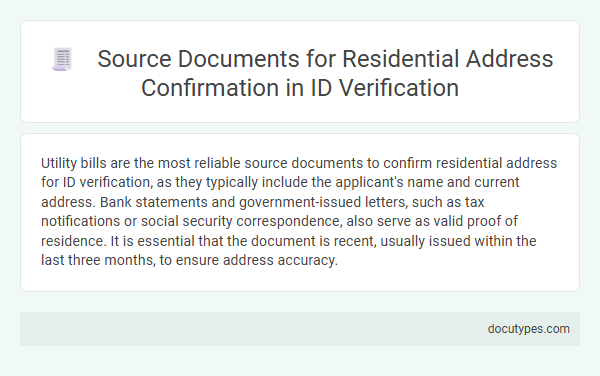Utility bills are the most reliable source documents to confirm residential address for ID verification, as they typically include the applicant's name and current address. Bank statements and government-issued letters, such as tax notifications or social security correspondence, also serve as valid proof of residence. It is essential that the document is recent, usually issued within the last three months, to ensure address accuracy.
Introduction to Residential Address Verification
Verifying a residential address is a crucial step in the identification process. It ensures the authenticity of an individual's location for secure and accurate identity confirmation.
- Utility Bills - Commonly accepted as proof of address, utility bills include electricity, water, or gas statements dated within the last three months.
- Bank Statements - Issued by financial institutions, bank statements showing the individual's name and address serve as valid address verification documents.
- Government-Issued Letters - Official letters from government agencies confirming residency support the legitimacy of the claimed residential address.
Using reliable source documents is essential for effective residential address verification during ID confirmation.
Importance of Source Documents in ID Verification
| Source Document | Confirmation Role | Importance in ID Verification |
|---|---|---|
| Utility Bills (Electricity, Water, Gas) | Verifies residential address through recent billing details | Highly trusted as they reflect current occupancy and address accuracy |
| Bank Statements | Confirms address linked to financial accounts | Essential for verifying personal financial records tied to residence |
| Government-Issued Letters (Tax, Social Security) | Validates residential address with official correspondence | Critical for verifying legitimacy due to government origin |
| Lease or Rental Agreement | Proves tenancy and residence at a specified address | Important for verifying temporary or permanent residential status |
| Mortgage Statement | Confirms ownership and residence of property | Highly reliable source showing financial responsibility for the address |
| Driver's License or State ID | Displays address officially recognized by state authorities | Primary ID document often used for quick confirmation of residence |
Your choice of source document plays a crucial role in successful ID verification by providing trustworthy proof of residential address. Selecting documents issued within the last 3 months enhances verification accuracy and acceptance.
Commonly Accepted Proof of Address Documents
Which source document confirms your residential address for ID verification? Commonly accepted proof of address documents include utility bills, bank statements, and government-issued letters. These documents must clearly show your name and current residential address to be valid.
Utility Bills as Residential Address Evidence
Utility bills are commonly accepted source documents for confirming residential address during ID verification. These bills, such as electricity, water, or gas statements, provide official proof of a person's residence. Verification processes often require the document to be recent, typically within the last three months, to ensure accuracy.
Bank Statements for Address Confirmation
Bank statements serve as a reliable source document for confirming residential address during ID verification. They typically include the full name and address, matching the individual's details.
You can use recent bank statements, usually within the last three months, to verify your residential address. Financial institutions frequently update these documents, ensuring accuracy and acceptance for verification purposes.
Government-Issued Documents for Address Verification
Government-issued documents serve as the most reliable sources for confirming residential addresses during ID verification. Documents such as utility bills, tax statements, and official correspondence from government agencies provide credible and verifiable proof of residence.
Among these, driver's licenses, state ID cards, and voter registration cards often include the holder's residential address and are widely accepted for verification purposes. These documents ensure accuracy and help prevent identity fraud by linking the individual to a physical address confirmed by government records.
Lease or Rental Agreements as Proof of Residency
Lease or rental agreements serve as primary source documents that confirm a residential address for identification verification. These agreements provide legally binding proof of residency by detailing the occupant's name, property address, and rental terms.
Financial institutions, government agencies, and service providers commonly accept lease or rental contracts to validate an individual's address during identity verification processes. These documents must be current and include signatures from both the tenant and the landlord or property manager. The presence of a clear address on the agreement makes it a reliable source for establishing residency in official records.
Insurance Documents for Address Validation
Insurance documents serve as reliable sources for confirming your residential address during ID verification. Utility bills and bank statements are common proofs, but insurance papers, such as homeowners or auto insurance policies, provide official address validation linked directly to your identity. These documents typically include your full name, address, and policy details, making them essential for accurate address verification in identification processes.
Recent Tax Documents as Address Sources
Recent tax documents serve as reliable proof of residential address for ID verification, reflecting up-to-date and official information. These documents are widely accepted due to their government-issued status and detailed personal address data.
- Recent Tax Returns - Tax returns filed within the last 12 months often include the taxpayer's current residential address and are accepted as valid proof.
- Property Tax Statements - Official property tax bills displaying the property owner's address confirm residency and are used in address verification processes.
- Tax Assessment Notices - Assessment notifications sent by tax authorities show the individual's or household's registered address, supporting ID verification requirements.
Which Source Document Confirms Residential Address for ID Verification? Infographic

